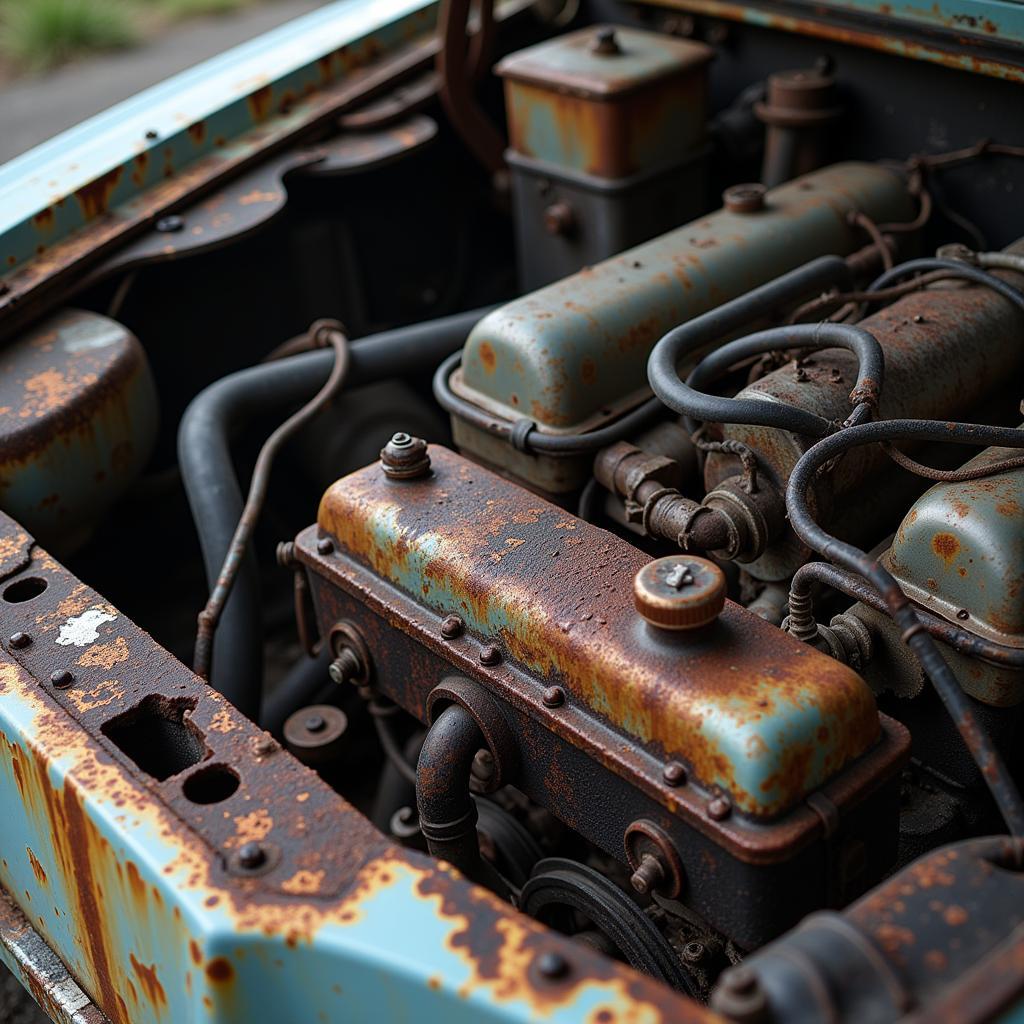Purchasing a used car can often feel like navigating a minefield, especially with the looming risk of flood-damaged vehicles. Flood cars, having endured submersion in water, present a Pandora’s Box of potential problems that can quickly turn your dream purchase into a financial nightmare. These issues can be expertly masked, making it even more crucial to arm yourself with the knowledge to spot them.
What Makes Flood Cars So Problematic?
Water and vehicles simply don’t mix. When a car is submerged, water infiltrates every nook and cranny, wreaking havoc on its intricate systems. Electrical components, being particularly susceptible, can short circuit, corrode, and malfunction. Mechanical parts, too, suffer from rust and premature wear.
 Flood-Damaged Engine
Flood-Damaged Engine
Telltale Signs You’re Dealing with a Flood Car
Identifying a flood car requires a keen eye and careful inspection. Here are some key indicators:
- Musty Odor: A persistent damp or musty smell, often masked by air fresheners, can be a giveaway.
- Water Stains: Check for water lines or discoloration on upholstery, carpets, and inside the trunk.
- Mud and Debris: Look for mud, silt, or debris in unusual places like the glove compartment or under the seats.
- Rust and Corrosion: Examine metal parts, particularly under the dashboard, for signs of rust or corrosion.
- Foggy Headlights or Taillights: Condensation inside the lights can indicate water damage.
The Cascade of Problems Flood Cars Can Present
The issues stemming from flood damage are not always immediately apparent. Here are some common problems to anticipate:
1. Electrical System Mayhem:
From faulty wiring to malfunctioning sensors, electrical gremlins can plague flood-damaged cars, leading to intermittent issues and costly repairs.
2. Mechanical Malfunctions:
Water damage can corrode and seize engine components, transmissions, and brakes, compromising performance and safety.
3. Airbag Deployment Issues:
Flood-damaged airbag systems pose a serious safety hazard. They may fail to deploy in an accident or deploy unexpectedly.
4. Mold and Mildew Growth:
Lingering moisture creates a breeding ground for mold and mildew, compromising air quality and posing health risks.
5. Premature Rust and Corrosion:
Water accelerates rust and corrosion, weakening the car’s structure and leading to costly repairs down the line.
Protecting Yourself: Essential Tips for Buying Used Cars
- Obtain a Vehicle History Report: A comprehensive report from companies like Carfax or AutoCheck can reveal past flood damage.
- Engage a Trusted Mechanic: Have a qualified mechanic thoroughly inspect the car before purchasing.
- Trust Your Instincts: If a deal seems too good to be true or something feels off, walk away.
“Always prioritize a thorough inspection by a trusted mechanic, especially when considering a used car purchase,” advises John Miller, a seasoned automotive engineer at Autotippro. “It’s an investment that can save you from costly headaches down the road.”
What to Do if You Suspect You’ve Purchased a Flood Car
If you suspect you’ve unknowingly purchased a flood-damaged car, don’t despair.
- Document Everything: Take detailed photos and notes of any evidence of flood damage.
- Contact Your Insurance Company: Report your findings to your insurance company to explore coverage options.
- Seek Legal Advice: If necessary, consult with a lawyer specializing in consumer protection or automotive law.
Conclusion: Navigate the Used Car Market with Confidence
Buying a used car should be an exciting experience, not a stressful one. By understanding the risks associated with flood cars and arming yourself with knowledge, you can make an informed decision and protect yourself from potential pitfalls. Remember, thorough research, careful inspection, and a healthy dose of skepticism are your best allies in navigating the used car market.
Need expert assistance with car problems? Contact AutoTipPro at +1 (641) 206-8880 or visit our office at 500 N St Mary’s St, San Antonio, TX 78205, United States. We’re here to help you navigate the complexities of car ownership.




Leave a Reply